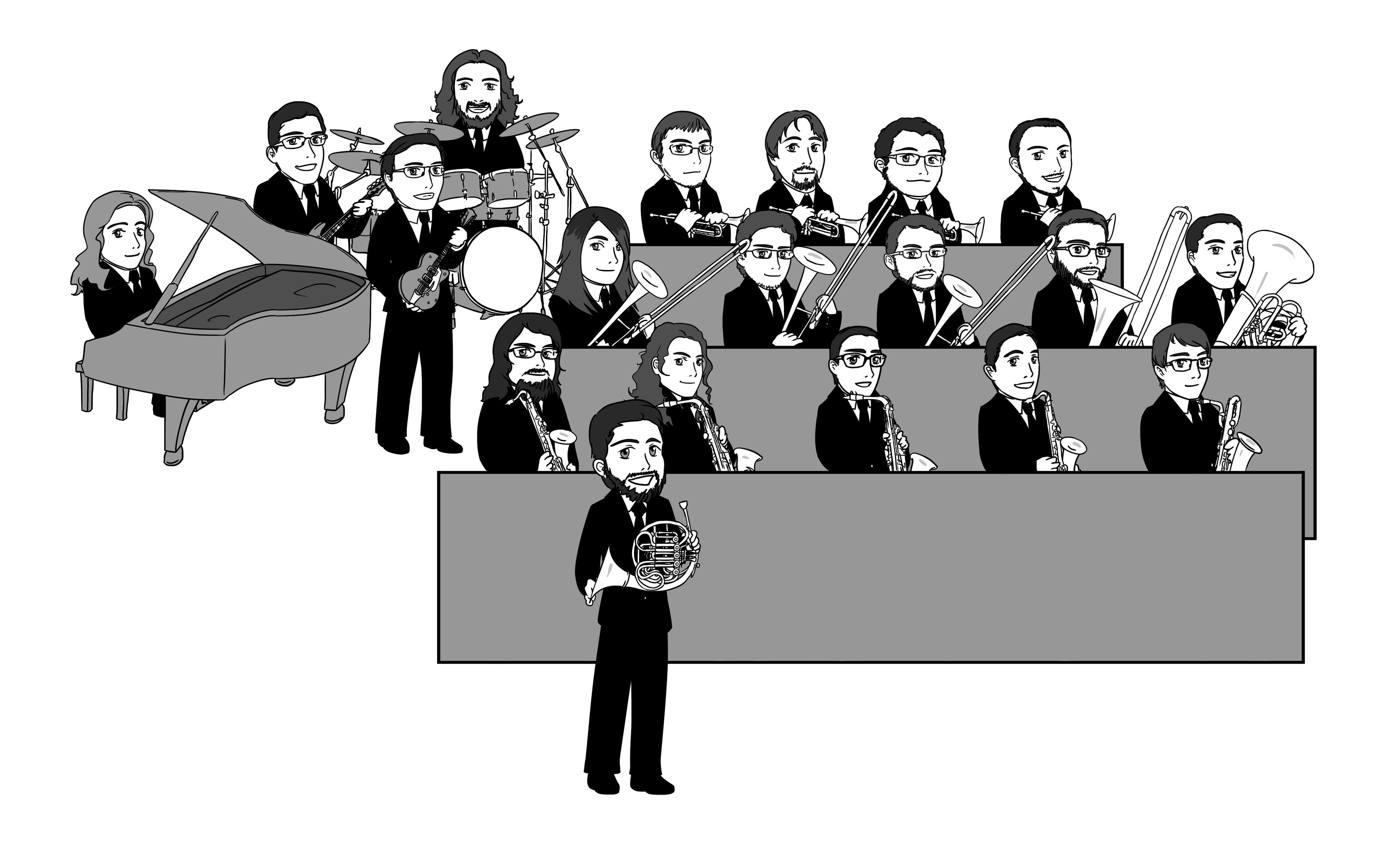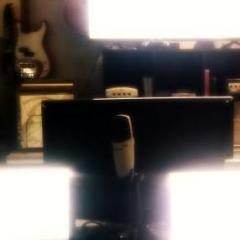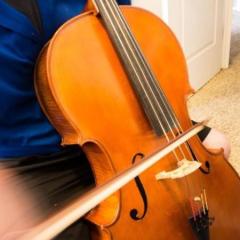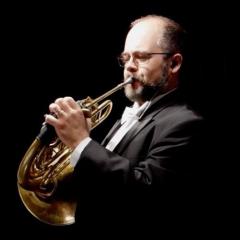-
Posts
195 -
Joined
-
Last visited
-
Days Won
13
Profile Information
-
Real Name
John Stacy
-
Location
Amarillo, Tx
-
Occupation
Teacher/Freelance Jazz Performer
Contact
- Personal Website
Artist Settings
-
Collaboration Status
2. Maybe; Depends on Circumstances
-
Software - Digital Audio Workstation (DAW)
Reaper
-
Software - Preferred Plugins/Libraries
Cinesamples, Default Logic Plugins, Fluid GM3
-
Composition & Production Skills
Arrangement & Orchestration
Mixing & Mastering -
Instrumental & Vocal Skills (List)
French Horn
Saxophone: Alto
Saxophone: Baritone
Saxophone: Tenor
Trombone
Trumpet
Tuba
Vocals: Male -
Instrumental & Vocal Skills (Other)
Jazz Improvization
Recent Profile Visitors
6,450 profile views
JohnStacy's Achievements
Newbie (1/14)
-
Rare
-
Rare
-
Rare
Recent Badges
-
So the unfortunate bit with orchestration is that it's really hard to get familiar with without digging into it extensively. Although there's a lot of resources available for learning orchestration - a lot of books, a really good extensive youtube channel (Thomas Goss, orchestration online) - the issue is that applying that information is not easy to start doing. To be honest, when I first started orchestrating I just started applying instruments based on how I heard them used - trumpets were loud and brilliant, so use them for loud, glorious moments. Horns were flowing and elegant, so have them doing countermelodies. Strings *were* the "orchestral" sound, so have them doing everything. This was a good start and in reality I still do this, but a bit more nuanced. I've also gotten a degree between now and then, so I had some help, but here are the places I would start: For one, don't think about roles. Thinking about roles and who has what is a very inefficient way to develop your orchestration. Think about textures. The reason I say this is that when you think about textures, you're thinking about roles in context. If you were going for a brilliant heroic texture, perhaps the brass would be playing the melody and harmonizing it, while the strings and woodwinds would be supporting it. An example would be having the woodwinds playing fast running lines landing on notes that accent certain chord tones while the strings are playing arpeggiated patterns or driving rhythms. Already, you can get a pretty defined idea of what instruments will play what, much more clear than "this instrument has melody, this one has harmony, and this one has support." You end up saying the same thing, but with much more efficient transfer of information. Just play around with combinations. Gradually, you'll start to figure out what instruments sound like when playing in various contexts - in their extreme high or low registers, or accented, or softly - and then can make new decisions based on that. If you know you want some kind of reedy aspect to the sound, think about what instruments you have available. Do you want piercing reediness, and it's high? Oboe or clarinet. Do you want that but it's low? Bassoon maybe. Do you want brassiness, but very warm and not edgy, and it's in the mid range? Add horn. What about if you do want it edgy and intense? Put the trombone playing in the same range for added brassiness. These are just examples, but that's more or less how orchestrators think of these things. Unfortunately, there isn't really a good collection of these that doesn't start to look suspiciously like an orchestration textbook. But if you listen to a lot of music and try to ask yourself, "what textures are they using and what effect does it get" you'll start to notice some common threads that make that happen.
-
 djpretzel reacted to a post in a topic:
What are you up to these days?
djpretzel reacted to a post in a topic:
What are you up to these days?
-
In late June I was in a car wreck. At 60mph I slammed into the flat side of a trailer front on. I'm alright, as is my wife, but I'm starting to wonder if I'm having PTSD from that. We were driving down to sign the paperwork for a house, which we then bought. We moved down on the first of July. In moving down, we were hoping to seek opportunities that hadn't previously existed to us - wife is a real estate appraiser and Midland, Tx has a shortage of those. That's also where I grew up, so moving home seemed like a good idea. There is also a shortage of private lesson teachers in many musical areas - I was told that my areas of expertise (French horn and music theory) would be in high demand. However, moving down here ran us into more issues than solutions. That is to say both my wife and I have experienced extensive radio silence from many parties. The banks and agencies that seemed so excited for her to move here have been slow to respond since moving here, if they respond at all. Similarly, although the band directors I have communicated with have all been very helpful, the administration that I have to report to to approve me to teach in the district is not responding at all. I have sent numerous emails, phone calls, and even went up to the administration building just to be met with confusion or not met at all. We aren't in trouble yet. We had an okay savings set aside, but that will run out if we can't get more work soon. We are both feeling very defeated at the whole situation. Because of the pandemic, I'm understanding if responses are slow. However, I'm not understanding radio silence that lasts for several months. I understand if there are plenty of fires to put out and some emails slipping through the cracks, but I'm not understanding every email and phone call for 3 months slipping through the cracks. I was trying to produce more music, but burnout killed that.
-
JohnStacy started following Thanksgiving , Equipment trade - Wind instruments for bass , Building a studio from scratch and 2 others
-
Hello! I'm going to get right to it. Does anybody have a 5-string electric bass they would be willing to trade for a trumpet or saxophone? (Maybe other things, I have quite a few brass and woodwind instruments) Over the last few months, I've explored different musical genres, and want to produce more music by myself. I've gotten an electric guitar and drum set (I've actually had that one for years), also bought a midi keyboard. The last thing on my list is a bass. I can save up for one, no issue, but had the idea to check to see if anybody had one they would want to trade. There are a few wind instruments I have extras of, and I think I could justify trading one of the duplicates. Everything I would be willing to trade (with one exception) is high quality and has been played professionally. If you're interested, send me a message or comment on here. Thank you for your time!
-
 Lily L reacted to a post in a topic:
DAW based on sheet music?
Lily L reacted to a post in a topic:
DAW based on sheet music?
-
I will say that in Texas, cement is the default, and in this case, I don't think the city of Midland will allow it without a cement base. So that is a check. Cinderblock filled with sand is not something I've considered, as I didn't know that was an option. But I will definitely look into it, especially in regards to how it works with unusual geometry. The windowless thing was something I was aiming to do, but I'm a bit hesitant. I may have a single window that's really thick, just for sunlight purposes. Don't want my space to be THAT isolated form the rest of the world now.
-
 thebitterroost reacted to a post in a topic:
Building a studio from scratch
thebitterroost reacted to a post in a topic:
Building a studio from scratch
-
 Geoffrey Taucer reacted to a post in a topic:
Building a studio from scratch
Geoffrey Taucer reacted to a post in a topic:
Building a studio from scratch
-
For the first time in my life, I am in a position to have my own dedicated studio space. Up until now I've had to share a space with somebody who doesn't do music stuff (so I can't treat the space) and also I haven't had access to it at all times. Right now I'm sharing with my wife who uses the space for her office as a real estate appraiser for ~8 hours per day. Anyway! I'm moving into a house, and I have space in the backyard to build a dedicated studio building. Some family members have agreed to help me build the thing, so I really only have to pay for materials. I have some plans for the acoustic treatment (mainly how to build those myself), but nothing set in stone yet. The purpose of this studio will be mostly for recording brass instruments (primarily French horn). I am wanting to treat the space with this in mind. It'll most likely be a 19'x13' space. I can make it smaller, but not bigger. I would prefer not to make it smaller, as small spaces are not only harder to play in for brass instruments, but also make the sound less than desirable, and harder to work with (especially with horn). Does anybody have any things I should consider, any advice, etc? Has anybody built a studio from the ground up and can offer things they learned? Are there any quality of life or convenience things that I should consider?
-
 Eino Keskitalo reacted to a post in a topic:
What are you up to these days?
Eino Keskitalo reacted to a post in a topic:
What are you up to these days?
-
The Corona has caused a lot of changes in my life, some positive, some negative. I'm a band director normally, and that is not something that translates to online well. I get tons of people telling me "just make a virtual ensemble" or "use this time to teach theory or production" at which point I point out that I'm not the only band director in the district, and I am in charge of the remedial kids. IE, a middle school band made up of mostly 7th graders that were at the bottom of their beginner classes the previous year. So the online transition has not been easy, fun, or productive. I feel like such a lazy POS, because I have tried to do the absolute minimum amount of work as a teacher, when in reality I know that a lot of the kids I teach are not self motivated by any stretch of the imagination. I can give playing assignments, etc, but does that actually teach anything? The district policy is one assignment per week, and you have to balance that with the core classes, which take priority. So I can't really teach much during this time. That is a lot more stressful than you would think. Because of that, I've gotten time to do other things that I haven't had time to do. My workload dropped from 80-110 hours per week to about 10, which is pretty much 2 full time jobs' worth of time. So what have I been doing with it? I've started producing more music. Original music, VGM arrangements to be released on a YouTube channel starting at the end of the month, writing scripts for some educational theory content I want to produce, etc. I've also been able to practice horn as much as I need to (2 hours per day minimum). I've been able to start walking again, and do 4-6 miles per day. On the walk I answer emails from my phone if needed. I've also started studying Japanese again. I've missed doing that a lot, and it's nice to be back. This all sounds like a lot, but it actually gives me a routine to use - Wake up 8:30, walk 8:40-10:15 or so. Study Japanese from then until right before noon, then check morning turnip prices in AC. Short lunch, then practice until 2 or 3. From 3 to 10 is whatever else I feel like doing. Sometimes arranging, sometimes streaming, etc.
-
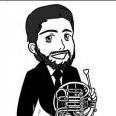
YouTube channel - Arrangement for Wind band
JohnStacy replied to Thetigerblack's topic in Post Your Game ReMixes!
I did some listening to what you have posted. I will say it tripped me out a bit to see tuba in Bb bass clef, which isn't common in the US. It's been a while since I've dealt with European scores. I do have to ask, why wind band? I don't mean that in a bad way. I am just curious. (I do quite a lot of work with various wind ensemble types, mainly as a session brass player, but also arranging, composing, and teaching.) Any time something comes up on OCR that is orchestral or winds, it piques my interest. -
Thank you for joining the discussion! Since this thread happened, I've found a few new options. I still use Sibelius due to large assignments still needing to be done. After May, I'll have more downtime. I'm going to give Dorico 3 a shot. Mainly because although Dorico isn't a DAW, it has gained so many more DAW like features. Now it gives the option to edit midi information and other automation things with envelopes. So although you do still need a DAW for audio purposes, most of the midi prep can be done in the notation software, and a lot of the changes can be changed and saved with the symbols. A FP dynamic can be mapped to a specific velocity curve and saved to a CC value, then exported with the midi. When imported into the DAW, this takes care of most of the editing work that would need to happen in the DAW normally. So for the purposes of using notation software like a DAW, Dorico 3 looks to be the closest bet. It currently supports sample libraries, but their use is somewhat unwieldy. I'm fairly confident that by Dorico 4 the level of sample support will grow to a point when you can enter everything in notation, then do some editing in the same program, and have a mockup using samples that is much more efficient that ever before. Especially since it is highly likely that the template will be adjusted organically (assigning an accent symbol to automatically layer a staccato and legato patch at the same velocity). I wouldn't be surprised if this is already in the works, or does exist in 3 with some semblance of functionality.
-
I am both an orchestrator and orchestral performer, so this is something I can comment on effectively. First of all, thank you for writing an orchestral track that isn't just the stereotypical cinematic "epic" horns blasting the whole time thing. You actually wrote an orchestration that captures the history of orchestral writing much more effectively than that. I'm absolutely horrible at reading piano roll, so I really can't tell you if that's good writing or not. Nothing sounds off, which is good. The textures are varied and there is a good management of register, which a lot of people tend to just ignore. However, the sample quality is low. If there were a reason it's not submission ready, it would be that. Listening to a live orchestral recording, then this back to back is a huge difference, almost jarring. The writing is fine, but the samples definitely are a loss.
-
 derezr reacted to a post in a topic:
Thanksgiving
derezr reacted to a post in a topic:
Thanksgiving
-
 Silverpool64 reacted to a post in a topic:
Thanksgiving
Silverpool64 reacted to a post in a topic:
Thanksgiving
-

3. completed Why my Zelda OoT remix album failed on sales?
JohnStacy replied to Gerard White's topic in Post Your Game ReMixes!
I can't listen to it now, but did you license it? Or did you just make it and release it? -
It is straightforward to learn, and does what it does well. For each tool or module, it is easy to tell what it is supposed to do, and the interface is highly responsive. Although it does have some automated features, it mainly is a set of tools that you have to use yourself. I would say that you could definitely learn it in a short amount of time.
-
It's the day before Thanksgiving. I'm thankful for this community and the people in it. You guys are pretty neat.
-
Since a lot of learning mastering is learning process and how to listen to a track, no plugin is going to make that much easier. Eventually you'll have to just learn the process. However, Ozone is highly effective. You'll be able to use it just fine with no prior knowledge, and as you learn more you'll get more out of it.
-
For a project like this, a literal bass line would be more useful. I'm not sure if I know of a community of people who would benefit. It's a weird situation where I know that there are people who would benefit, just not directly. Similar to how I know there are nuclear physicists, but I don't know of a specific community, nor do I know any nuclear physicists. As for contributing to the VGLeadsheets, you can, but I will say that we are currently under a priority crunch to get as many of our backlogged sheets (we have about 50-60 of those currently) ready for the jamclinic at Magfest this coming January. However, starting in January we will be open to new submissions again. The reason for this is because we have an extensive, multiple step validation process for all sheets to ensure accuracy and readability. Our backlog right now is based on a series of frequent requests we've gotten over this last year for sheets to jam to. Send me a message and I can send you the communication links.
-
This has been done before, to an extent. I think there's an online radio station that plays many things from OCR, although I don't know if it's still running and can't remember the name. Running something like Spotify is expensive. The infrastructure needed to run it is costly and difficult to set up. You need to fund server costs and licensing fees, provided the artists didn't do this themselves. As a result, most OCR content wouldn't be legal to stream. So you could make a free service to stream these things, and hope that you don't have legal action taken against you, or you could go through the proper channels, ensure everything is licensed, and charge either some or all users a fee to help cover the costs of running the service. As for the streaming itself, would you write your own streaming module? Or would you use one already written? You have to have some method to play the audio, involving either one very active developer, or a team of developers. Again, you have the issue of funding. Passion projects happen all the time - that's how winamp was started. And if you can find people to work on it in their spare time, you could definitely get a workable streaming platform. So to create a vgm streaming platform of only remixes? Great idea. But there is a huge amount of work and planning that needs to happen to make it a possibility, and even more work that needs to happen to keep it in a good legal standing. If a company that owns the rights to the original work being remixed comes along and tells you to shut it down, you have to shut it down. If you license all of your content properly, that is prevented, but that costs money which has to come from somewhere.

